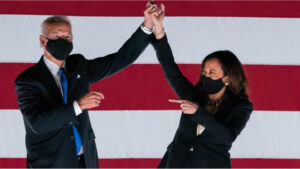
Young voters put forth every effort to vote in this year’s presidential election despite COVID-19 prohibiting in-person interactions. Ballots were cast by mail, voting lines filled up and students made their way to the polls. The election has finally ended, and Joe Biden and Kamala Harris will take their places as president and vice president in 2021.
But the work does not stop there. FAMU’s chapter of Progressive Black Men and Ubuntu sponsored a discussion on Wednesday titled “What Happens Next?” The discussion focused on the steps the Black community should take following the results of the election. The panel included Representative Fentrice Driskell, lead organizer of Dream Defenders Marie Rattigan and State Attorney Monica Harris.
The panel came to a consensus that the Black community must continue to put forth their effort to encourage change and continue to apply pressure on political leaders.
“The focus should be harnessing our power and remaining engaged after election season on the voter side,” Harris said. “And on the political side it is to ensure that we are cultivating relationships with the Black community regularly and not every two and four years.”
Rattigan agreed that there is immense power in the student vote. She worked with Dream Defenders and fellow students to increase the student vote this November.
“As an organizer, I was one of the leaders who were pulling people to the polls, knocking on dorms, and handing out flyers,” Rattigan said. She hopes to build an organization or network of young voters so they don’t lose the momentum they had this year.
According to an article in the Orlando Sentinel, this year more than 240,000 youths voted in comparison to 44,000 in the 2016 election.
Another important topic of discussion was holding elected official accountable for their promises to the Black community. Rep. Driskell explained there are multiple ways to maintain accountability beyond using social media.
“If there is someone in office that you don’t like, you vote them out,” Driskell said. “But don’t be above reaching out and trying to contact your elected officials, especially those at the local level.”
U.S. Senators have field offices that students can contact to voice their concerns or issues. If bills are being passed, constituents can call for a meeting with the elected officials to discuss the terms of the bill and how they affect citizens in their districts.
The panelists also discussed Gov. Ron DeSantis’ impending policy change that inflicts punishment on protesters. The policy change would make participation in a protest that results in property damage or roads being blocked a felony. Citizens who also donate to protesters would be at risk for the state’s racketeering laws. Protesters charged with a felony would then lose their ability to vote in future elections.
“Fundamentally it is a direct attack on your First Amendment rights,” Harris said. “It also makes me wonder if this policy would have ever been proposed if it weren’t Black and brown people on the front lines fighting for issues that affect them.”
Historically, HBCUs and college students have been at the forefront of protests and marches dating back to the Civil Rights Movement. The panelists discussed how this policy change is used to directly infringe upon the rights of young voters and prevent them from joining forces.
“There is power in protest,” Driskell said. “There is power in protesting through marching, through voting and through speaking. We cannot take our foot off the gas.”
If you would like to watch the discussion in full, the video is posted on the Ubuntu website located at https://ubbuntu7.wixsite.com/ubuntucr